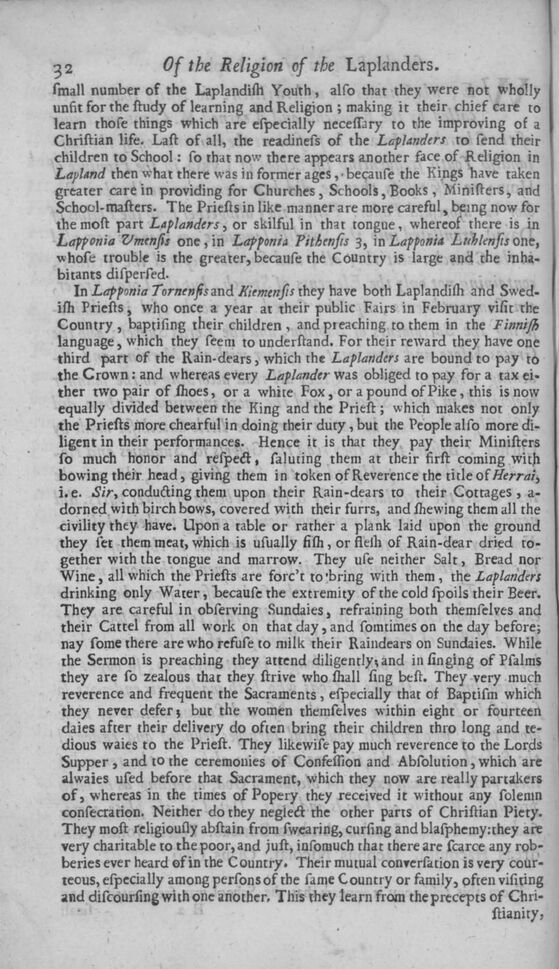
Full resolution (JPEG) - On this page / på denna sida - Sidor ...

<< prev. page << föreg. sida << >> nästa sida >> next page >>
Below is the raw OCR text
from the above scanned image.
Do you see an error? Proofread the page now!
Här nedan syns maskintolkade texten från faksimilbilden ovan.
Ser du något fel? Korrekturläs sidan nu!
This page has been proofread at least once.
(diff)
(history)
Denna sida har korrekturlästs minst en gång.
(skillnad)
(historik)
small number of the Laplandish Youth, also that they were not wholly
unfit for the study of learning and Religion; making it their chief care to
learn those things which are especially necessary to the improving of a
Christian life. Last of all, the readiness of the Laplanders to send their
children to School: So that now there appears another face of Religion in
Lapland then what there was in former ages, because the Kings have taken
greater care in providing for Churches, Schools, Books, Ministers, and
School-masters. The Priests in like manner are more careful, being now for
the most part Laplanders, or skilful in that tongue, whereof there is in
Lapponia Vmensis one, in Lapponia Pithensis 3, in Lapponia Luhlensis one,
whose trouble is the greater, because the Country is large and the
inhabitants dispersed.
In Lapponia Tornensis and Kiemensis they have both Laplandish and
Swedish Priests, who once a year at their public Fairs in February visit the
Country, baptising their children, and preaching to them in the Finnish
language, which they seem to understand. For their reward they have one
third part of the Rain-dears, which the Laplanders are bound to pay to
the Crown: and whereas every Laplander was obliged to pay for a tax
either two pair of Shoes, or a white Fox, or a pound of Pike, this is now
equally divided between the King and the Priest; which makes not only
the Priests more chearful in doing their duty, but the People also more
diligent in their performances. Hence it is that they pay their Ministers
so much honor and respect, saluting them at their first coming with
bowing their head, giving them in token of Reverence the title of Herrai,
i. e. Sir, conducting them upon their Rain-dears to their Cottages,
adorned with birch bows, covered with their furrs, and shewing them all the
civility they have. Upon a table or rather a plank hid upon the ground
they set them meat, which is usually fish, or flesh of Rain-dear dried
together with the tongue and marrow. They use neither Salt, Bread nor
Wine, all which the Priests are forc’t to bring with them, the Laplanders
drinking only Water, because the extremity of the cold spoils their Beer.
They are careful in observing Sundaies, refraining both themselves and
their Cattel from all work on that day, and somtimes on the day before;
nay some there are who refuse to milk their Raindears on Sundaies. While
the Sermon is preaching they attend diligently; and in singing of Psalms
they are so zealous that they strive who shall sing best. They very much
reverence and frequent the Sacraments, especially that of Baptism which
they never defer; but the women themselves within eight or fourteen
daies after their delivery do often bring their children thro long and
tedious waies to the Priest. They likewise pay much reverence to the Lords
Supper, and to the ceremonies of Confession and Absolution, which are
alwaies used before that Sacrament, which they now are really partakers
of, whereas in the times of Popery they received it without any solemn
consecration. Neither do they neglect the other parts of Christian Piety.
They most religiously abstain from swearing, cursing and blasphemy: they are
very charitable to the poor, and just, insomuch that there are scarce any
robberies ever heard of in the Country. Their mutual conversation is very
courteous, especially among persons of the same Country or family, often visiting
and discoursing with one another. This they learn from the precepts of
<< prev. page << föreg. sida << >> nästa sida >> next page >>